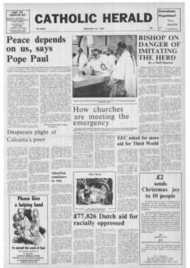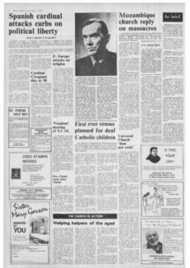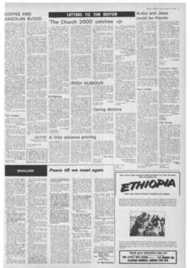Page 5, 21st December 1973
Page 5

Report an error
Noticed an error on this page?If you've noticed an error in this article please click here to report it.
Tags
Share
Related articles
Scots Report Hits Mixed Marriage Law
At Present The Archbishop Lefebvre's Society Of St Pius X
Declaration In Defence Of The Catholic Doctrine On The...
Lough Derg And 'our Lady Of Unity'
What Would Newman Make Of The Church Today?
LETTERS TO THE EDITOR
00' The Church 20 catches up
Is the Church 2000 as revolutionary as the members of the working party would have us believe? The Catholic Men's Society would say no!
The Decrees of Vatican II presented us (then the Catholic Young Men's Society) with a dilemma and a challenge. The dilemma was, should the old society which had helped Catholic men for over 100 years be allowed to die, and should OUT MCT1 wait for a new society — with a new structure — to emerge from our renewed Church?
It was, however, decided to reshape and remodel the old society having as our guide the Decrees of the Council. Indeed, as far hack as 1964 the society's planned discussion programme for that year had for its theme "Thy Kingdom Come through Loyalty to the Council". As a result of our study and discussion a new handbook emerged which is now providing us with a challenge — the challenge of driving home to our men and priests the need to implement the blueprint of our handbook.
This is why the document "The Church 2000" is not new to the C.M.S. — indeed to our members it is all too familiar. The chapter on the laity might well have been taken straight from our handbook.
We now offer our experiences or the past ten years to all those who sincerely intend to make the dream come true.
1 — It is possible to givt to men in our parishes a new understanding of the Church and a new awareness of what it means
Bullfighting
Pope St. Pius V regarded bullfighting as "A spectacle for demons rather than men" and excommunicated all who took part in it. (Encyclical De Salute Gregis, 1567). It is significant that Pope Pius XII refused to meet the representatives of the bullfighting industry.
In 1972, 5,500 hulls were tortured to death, Over 100 horses were killed; disembowelled or crushed. There was no escape — not for the matadors practise calves and cows.
Now Spain is a Catholic country, and it is surely in order to enquire what the Spanish bishops are doing to implement the teaching of the Popes on bullfighting.
37 Northiam, Woodside Park, London, N.I2. to be a Catholic and a Christian today. Men do respond to the challenge and inspiration of the New Charter of Church Membership which has been given to them. Men arc emerging within our society who have a new sense of mission.
2 — We Find it is possible through our promotion of planned discussion to bring to the laity of our parishes the wonderful new insights of present-day theology — and this is the problem. We can accommodate the jargon and the ideas to the capacity or the average man. It is possible to institute Bible study groups using the Lectionary Readings as a lead in.
3 — Our new understanding of the Liturgy and its relation to life makes it possible for us to introduce Theme Masses and Group Masses for men in our parishes; Theme Masses such as "Men at Work", "Men as Fathers". "Men as Husbands", "Men as Community Leaders".
4 — We have discovered that Christian formation and adult education is hest achieved in smaller groups. The value or this group method has been demonstrated wherever a branch of the society has been operating. All the above might be put on the credit side when evaluating the possible results of the implementation of The Church 2000. There is, however, a debit'account which the C.M.S. has experienced: I — Our membership has diminished the demands made on a committed Christian are far greater than those made on a practising Catholic; passively receiving a service is one thing — encouraging our Catholics to give a service is another.
2 — in too many of our parishes the real mission of the Church is identified with promoting the organisation; there is far too much preoccupation with the parish activities rather than living the Gospel message. The means appear to be more important than the end.
3 — The clerical paternalism or the past is still affecting our laity — to most, the clergy are still the Church. They have not yet learned that they, together with the priest, are the people of God. 4 — Many of the clergy are either unwilling or unable to form and lead in the manner the Church now calls for, 5 — Priests are insufficiently trained to provide the formation our laity needs. 6 — The formation and education of our laity is not given the priority it deserves; some proportion of the financial help given to child education should he devoted to adult education and formation.
When adult formation is available in each diocese, distrier, and parish for our men, then the C.M.S. will no longer be necessary. At present we know of' no other Catholic agency supplying this service. W. B. Hutchinson Hon. General Secretary, Catholic Men's Society of Great Britain Metropolitan Cathedral Buildings, Brownlow Hill, Liverpool.
"The first free-for-all in the history of the Church in this country" was Fr. John Fitzsimon's description of a request to the laity for suggestions and comments on "Church 2000."
Fr. Fitzsimons, a member oll the joint working party which produced "Church 2000" was speaking to the North Lancashire circle of the Newman Association at Winckley Square Convent School, Preston, on December 7.
The North Lancashire Circle intend to make a study of the document at future meetings. This is in accordance with the wishes of Bishop Foley of Lancaster who would like to see Church 2000 studied by small groups, throughout the diocese. One Preston group of the Sword of the Spirit has already begun this study with an introductory talk by Fr. John Hawkins a representative at the National Conference of Priests.
M. C. Winder 14 Regent Street, Preston.
blog comments powered by Disqus









